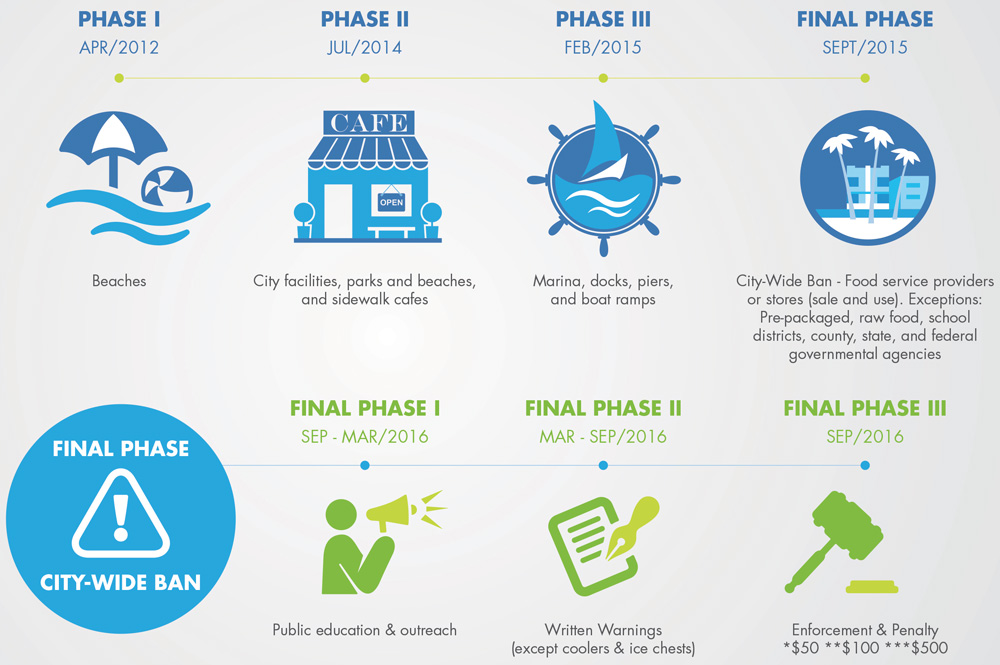What is expanded polystyrene (styrofoam) and why is it banned in Miami Beach?
Expanded polystyrene is a petroleum-based plastic product. It is not biodegradable and cannot be recycled. According to the Environmental Protection Agency (EPA), it can have serious impacts on human health, wildlife, and the aquatic environment (EPA-842-B-02-002). Polystyrene also contains toxic substances such as Styrene and Benzene, which are known carcinogens.

What alternatives are there?
 Fiber refers to paper fiber derived from trees. Food serviceware made from fiber is often flat sheets of thick paper material folded or molded into a container shape. It is sometimes coated with a thin layer of plastic.
Fiber refers to paper fiber derived from trees. Food serviceware made from fiber is often flat sheets of thick paper material folded or molded into a container shape. It is sometimes coated with a thin layer of plastic. Bagasse is the fibrous material that remains after sugarcane stalks are pressed. Bagasse variants refer to fibrous materials from other plant types that result from similar pressing processes. Food serviceware made from bagasse is a light brown or white (bleached) pressed and molded fiber material. It is sometimes coated with a thin layer of plastic or Polylactic Acid (PLA).
Bagasse is the fibrous material that remains after sugarcane stalks are pressed. Bagasse variants refer to fibrous materials from other plant types that result from similar pressing processes. Food serviceware made from bagasse is a light brown or white (bleached) pressed and molded fiber material. It is sometimes coated with a thin layer of plastic or Polylactic Acid (PLA). Wheat straw is the fibrous residue that remains after the grain is extracted from wheat stalks. Food serviceware made from wheat straw is typically a light brown or white (bleached) pressed and molded fiber material. It is visually similar to bagasse.
Wheat straw is the fibrous residue that remains after the grain is extracted from wheat stalks. Food serviceware made from wheat straw is typically a light brown or white (bleached) pressed and molded fiber material. It is visually similar to bagasse. Compostable Plastics are a new generation of plastics that are biodegradable through composting. They are derived generally from renewable raw materials like starch (e.g. corn, potato, tapioca, etc.), cellulose, soy protein, lactic acid, etc. are not hazardous/toxic in production and decompose back into carbon dioxide, water, biomass, etc. when composted. This category includes PLA1.
Compostable Plastics are a new generation of plastics that are biodegradable through composting. They are derived generally from renewable raw materials like starch (e.g. corn, potato, tapioca, etc.), cellulose, soy protein, lactic acid, etc. are not hazardous/toxic in production and decompose back into carbon dioxide, water, biomass, etc. when composted. This category includes PLA1.Miscellaneous Plastic products in this inventory are products that the vendor lists as “plastic” without providing any further detail about plastic type. There is not one set of physical characteristics that products in this material category have in common.
What key terms should I look for in alternative materials?
- Polylactic acid (PLA)- Polylactic acid (PLA) is a plastic polymer derived from non-petroleum sources including cornstarch, tapioca roots, and sugarcane. When marked for identification, it bears the number "7" in the center of the triangular recycling symbol. It is visually similar to PET products.
- Polyethylene terephthalate (PET)- Polyethylene terephthalate (PET) is a common plastic polymer type. When marked for identification, it bears the number "1" in the center of the triangular recycling symbol and may also bear the letters "PETE" or "PET". A PET container usually has a small dot left from the manufacturing process, not a seam. It does not turn white when bent. Food serviceware made from PET is usually transparent green or clear.
- Polypropylene #5 (and variants)- Polypropylene #5 is a plastic polymer that results in more rigid products than products made of PET and PLA. When marked for identification, polypropylene #5 items may bear the label “PP” or the number “5” in the triangular recycling symbol. Polypropylene #5 food serviceware products are most commonly clear or opaque black.

